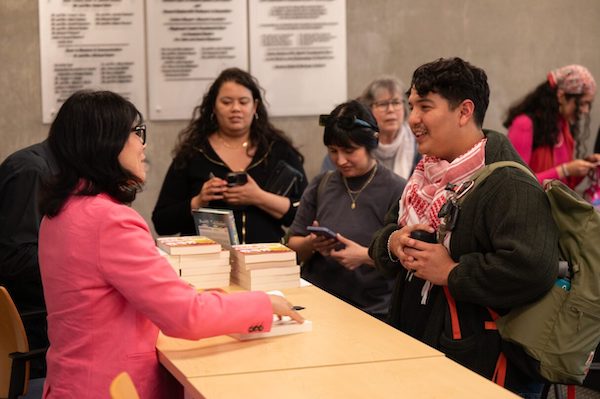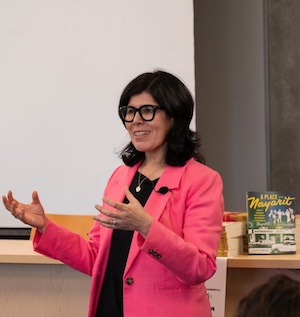By Dee Richards
The 2024 Phi Beta Kappa Visiting Scholar Program cohort brings 14 of the most ground-breaking and celebrated scholars to colleges across the country. The Key Reporter was privileged to catch up with Visiting Scholar Natalia Molina from the University of Southern California during her stop at the University of California, Irvine. As one of the nation’s leading Hispanic-Serving Institutions, UC Irvine invited her to discuss in greater depth her book A Place at the Nayarit: How a Mexican Restaurant Nourished a Community (2024), a work that has won The David J. Weber Book Prize and garnered high praise from The James Beard Awards, The LA Times Latinx Files, and more. Molina is Distinguished Professor and Dean’s Professor of American Studies and Ethnicity at USC as well as a recipient of the MacArthur Genius Fellowship. Her award-winning titles include How Race Was Made in America: Immigration, Citizenship, and the Historical Power of Racial Scripts (2014) and Fit to Be Citizens?: Public Health and Race in Los Angeles, 1879-1939 (2006). Phi Beta Kappa’s Mu of California chapter at UC Irvine was thrilled to host such an important scholar.
The series featured three additional events between April 16 and 17—a classroom visit, a community book signing, and a cooking demonstration inspired by dishes described in Molina’s book. At the first stop in this campus series, Molina visited Christofer Rodelo’s Chicano Studies course. The packed class of undergraduate scholars discussed their impressions of A Place at the Nayarit, a book that highlights how Molina’s grandmother, Doña Natalia, supported her Mexican immigrant community by founding what Molina refers to as an “urban anchor,” the Nayarit restaurant in Los Angeles. For the students, the most impactful message of the book was one of connection as they discussed matters of identity, challenging stereotypes, and economic and cultural gentrification of Latino neighborhoods. Molina stressed the importance of “telling our own stories,” she said, to fill gaps where such voices have often been excluded. A student, proudly calling Ecuador home, remarked on their own identity while reading about the vibrant community of people immigrating to Los Angeles from Spanish-speaking countries, looking for connection at the Nayarit. Molina said, “Immigration can lead to feelings of isolation” while “food and community can lead to a much-needed connection to their history.” Rodelo echoed this sentiment by saying that her visit was a welcome “bridge between the academic and personal,” and “a privilege to host a trailblazer that encapsulates the identities of the students” he serves.

This theme of connection followed into the campus community event where Molina asked others to “share their stories,” as would have been done at the Nayarit. Graduate students of UC Irvine connected with Molina to discuss their projects inspired by her work, and spoke of their families, histories, and their own research. Young scholars requested her guidance for their endeavors, which were precisely the stories of individuals that Molina prioritized when researching A Place at the Nayarit. Furthermore, through her book, she explained that she sought to “highlight the role that immigrants play as placemakers,” (a term coined by Molina). Many in attendance stayed well after the presentation for a book signing and to exchange stories. All questions and sentiments were addressed by Molina with kindness and curiosity, of which she stated that when conducting historical research, it is best to “lead with curiosity.” Within the space of an hour at this event, Molina was able to create a community with the attendees by leading with curiosity—no small feat.
The final event for Molina at UC Irvine was a cooking demonstration made possible by the school’s Nutrition Education Kitchen and Chef Jessica Van Roo, who presented dishes inspired by the Nayarit. Molina was excited to see such a remarkable cross-section of students from the liberal arts and sciences, making connections with many, including an exchange student from Dublin excited to experience the flavors of her grandmother’s iconic dishes. Of this experience, Molina observed, “Sharing food, whether in its preparation or consumption, serves as a universal language that fosters cultural understanding.” Phi Beta Kappa is proud to offer such a connection through its Visiting Scholars Program. As Molina observed: “Critical thinking and intellectual curiosity are vital for pursuing knowledge, but community is equally important. Talking with others invites diverse perspectives, fosters collaboration, and provides feedback to enhance one’s work. Phi Beta Kappa offers a community [of] support to elevate exceptional scholars across the generations.” The Society is honored to have Professor Molina as part of our Visiting Scholars community and appreciate the connections made during this year’s events.
Dee Richards is a cum laude graduate of University of California, Irvine holding a B.A. in English, with a creative writing focus. Richards received the honor of induction by UC Irvine’s Mu of California chapter in June 2023, a distinction only offered to the top five percent of graduating seniors there. Richards has won three awards in creative non-fiction and has received eight anthology publications to date.




